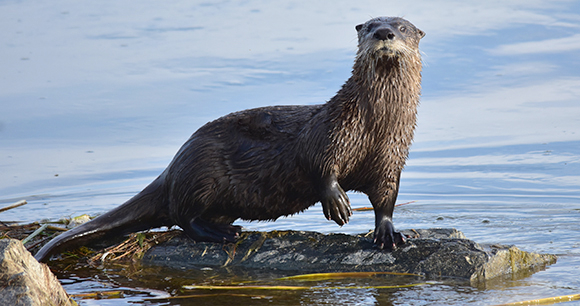
Washington, DC—Animals saw important victories in a bill (H.R. 8294) passed yesterday by the House of Representatives to fund the US Department of the Interior, the US Department of Agriculture, and other federal agencies in fiscal year 2023. The explanatory statements accompanying this package also include important directives to agencies regarding the implementation of laws pertaining to animal welfare. AWI commends this vital work by members of the House Appropriations Committee, and hopes the Senate will include similar provisions in its version of the appropriations bills.
The following provisions are included in the bill:
Animal Welfare Act
The bill provides funds for enforcing the Animal Welfare Act (AWA), the primary federal law ensuring humane care of animals used in commercial enterprises, and expresses the House’s frustration with the USDA’s feeble enforcement of that law. The House specifically expressed concern about the USDA’s lack of AWA enforcement regarding online dog dealers. Among other actions, the House directs the USDA to ensure (1) regular, consistent, and unannounced inspection of AWA-licensed facilities, (2) that the resulting inspection reports always include all conditions that are out of compliance with the law, and (3) that those reports be shared with relevant local, state, and federal agencies. The bill also increases funding for the Office of General Counsel to address its workload related to animal issues and continued the long-standing prohibition on licensing Class B dealers who sell dogs and cats acquired from random sources for use in experimentation and teaching.
Marine Mammals
The USDA is directed to prioritize and reissue proposed regulations related to the handling and care of marine mammals in captivity. Almost four decades have passed since the last update, and marine mammal science has made significant progress, which should be used to inform care and maintenance regulations—such as increasing minimum space requirements, establishing species-specific ambient temperature ranges, and mitigating the effects of noise.
Wildlife Services
The House has provided $4.55 million to Wildlife Services to “expand, develop, and implement nonlethal methods with a focus on reducing human-wildlife conflicts related to predators and beavers in the Western Region and Great Lakes.”
Endangered Species Act
H.R. 8294 increases funding for Endangered Species Act implementation to nearly $355 million, a $77 million increase over last year’s budget. The ESA has been desperately underfunded for years, despite the overwhelming evidence that we are facing a global extinction crisis, and this increase is needed to begin addressing a backlog of more than 300 species awaiting protection decisions, among other priorities.
Horses
H.R. 8294 blocks the operation of horse slaughter facilities in the United States by permanently barring the use of federal funds to inspect such facilities. The bill includes $4.1 million—an increase of more than $1 million from the prior fiscal year—to enforce the Horse Protection Act (HPA) and combat the abuses associated with the soring of Tennessee walking horses and related breeds. The USDA is directed to finalize a long-awaited rule that would strengthen the HPA and protect horses from soring.
For wild horses, the package offers numerous victories, including $11 million for the administration of humane, reversible fertility control vaccines to manage herds in their natural habitats. The bill extends protections to wild horses and burros against slaughter and lethal control, and includes key directives to improve oversight and accountability of the government’s management of wild equines—from improving the vetting of potential adopters to identifying suitable habitat for wild horses.
Trophy Hunting
The US Fish and Wildlife Service (USFWS) is prohibited from issuing permits for the import of sport-hunted elephant or lion trophies taken in Tanzania, Zimbabwe, or Zambia. It also must review the Trump-era policies that reduced transparency in the import permitting process, and report back to Congress about how to determine whether trophy hunting of these species harms their populations.
Trapping
The USFWS also must brief Congress on body-gripping traps used on national wildlife refuges and outline nonlethal methods that could replace trapping for wildlife management purposes.
Birds
Multiple agencies are directed to monitor their buildings for bird collisions and, at minimum, implement low-cost actions to minimize these collisions, which are responsible for as many as 1 billion bird deaths each year in the United States.
Mink
The USDA is directed to report to Congress on the new Mink SARS–CoV–2 Transmission Avoidance and Monitoring Plan (Mink STAMP), which is designed to monitor for COVID-19 infection on mink farms and minimize the risk of virus transmission among mink, humans, and other animals on and around mink farms. The USDA must share how it is encouraging greater state and industry participation, and what steps it will take to ensure comprehensive COVID-19 monitoring on mink farms. This transparency is vital for gaining a better understanding of the public health risks posed by mink farms in the United States.
Farm Animals
Beneficial directives for farm animals include language to ensure that the USDA remains transparent about the number of humane handling verification procedures performed and the number of administrative actions taken in livestock slaughter plants. The House also urges the department to work with producers to develop disaster preparedness plans to protect livestock, given that millions die annually during extreme weather events. Further, the USDA is directed to support alternative protein research and improve oversight of animal-raising claims on meat and poultry product labels so that such claims are meaningful and in line with consumer expectations.
Companion Animals
H.R. 8294 provides $3 million for grants to assist domestic violence survivors with companion animals under the Protecting Animals With Shelter (PAWS) program.
Margie Fishman, Animal Welfare Institute
[email protected], (202) 446-2128
The Animal Welfare Institute is a nonprofit charitable organization founded in 1951 and dedicated to reducing animal suffering caused by people. AWI engages policymakers, scientists, industry, and the public to achieve better treatment of animals everywhere—in the laboratory, on the farm, in commerce, at home, and in the wild. Follow us on Facebook, Twitter, and Instagram for updates and other important animal protection news.